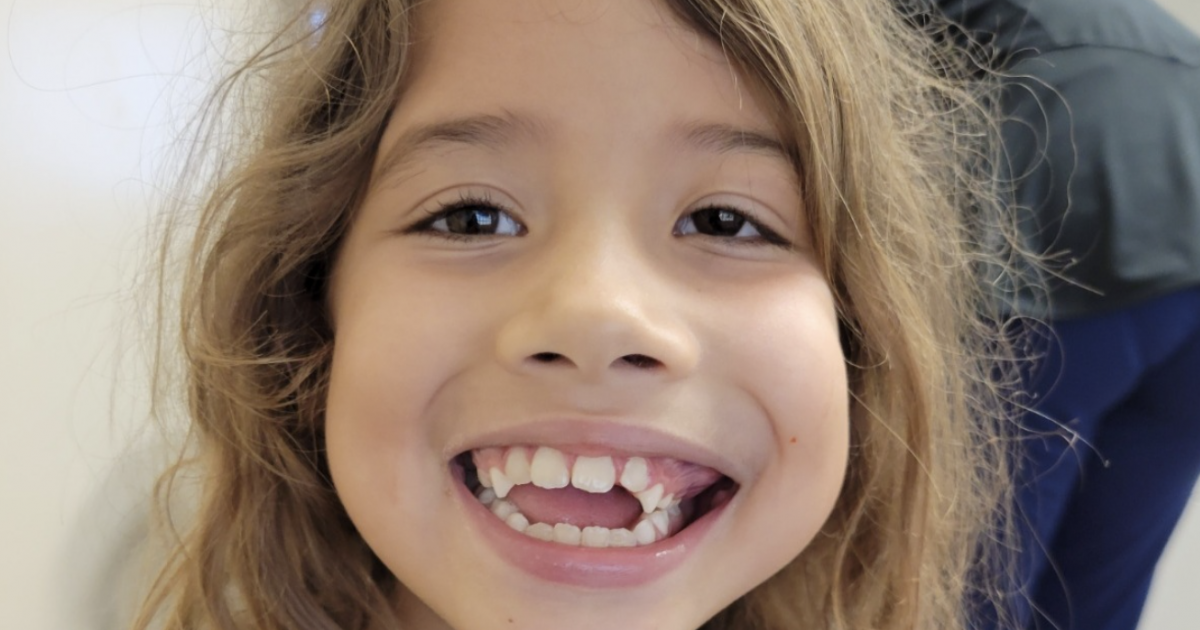Brave Girl, 7, Battles Rare Cancer That Caused Massive Tumor To Grow In Mouth
- Aubrey Romero, 7, is undergoing chemo and radiation for as long as 12 hours each day after having a dentinogenic ghost cell tumor removed from her face in an intricate surgery requiring doctors to rebuild her jaw with bone and muscle and ligament from her shoulder.
- Aubrey first complained of symptoms in September, and within days, the tumor had grown to be the size of a softball. Doctors thought they might be able to get all the cancer during surgery, but a scan showed that the disease had spread to her brain, requiring her to undergo the intense chemo treatments she is enduring in Miami.
- Doctors must work quickly to remove the tumor because of its rapid growth rate. After surgery, there may be radiation or chemotherapy to kill any lingering cancer cells. The cancer is also likely to return at some point, so patients must be closely monitored.
Aubrey Romero is now undergoing chemotherapy and radiation treatments that can last as long as 12 hours after doctors surgically-removed a softball-sized dentinogenic ghost cell tumor.
Read More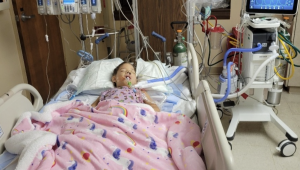
It has only been two months since Aubrey first exhibited symptoms, which began with a swollen face that her parents initially mistook for a tooth infection.
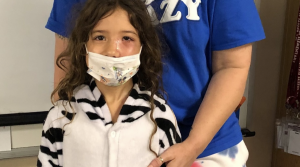
They wasted no time getting to work once doctors figured out it was a very rare dentinogenic ghost cell tumor.
That required a massive surgery where a surgeon to removed half of Aubrey’s face to extract her hardened tumor. The surgeon then reconstructed her jaw using bone, muscle, and ligament.
Aubrey was somehow in good spirits through it all, but it has started to take a minor toll. Given the shock of the anesthesia and what she would wake up to after going under for surgery, Aubrey is now afraid to fall asleep, says her mother.
Doctors were optimistic that the surgery would be enough to rid Aubrey of the cancer, but that was not the case.
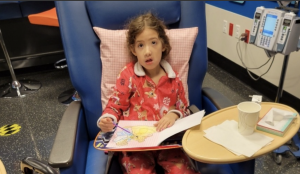
Soon after the surgery, a scan showed that the disease had spread to her brain, requiring her to undergo the intense chemo treatments she is enduring in Miami.
The young girl has her family and friends behind her, plus some additional support from two new supports dogs she brought to Miami to help her beat cancer.
And even in her darkest hour, Aubrey is still spreading cheer.
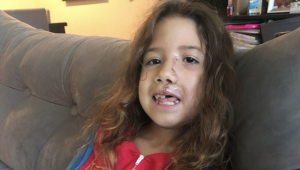
“Aubrey had to have her face, all of the side removed, teeth, part of her gum, lip,” her teacher Lori Schumaker told Fox 13. “I saw her right after surgery, and she still had this huge smile on her face and crawled up in my lap and said, 'I love you.'”
What Is Dentinogenic Ghost Cell Tumor?
There are few conditions as rare as dentinogenic ghost cell tumor.
These calcified cysts begin to grow in the teeth and then spread through the head and neck.
Eosinophilic and epithelial cells fuel the tumor’s growth. Eosinophilic cells are white blood cells that help the body fight off parasites, allergens, and in some cases, cancer. In contrast, epithelial cells serve as the barrier between the human body ad organs and the outside world.
In dentinogenic ghost cell tumor cases, those cells have lost their nuclei but not their shape, size, structure, or form.
Doctors must work quickly to remove the tumor because of its rapid growth rate. After surgery, there may be radiation or chemotherapy to kill any lingering cancer cells.
Doctors require patients to be screened after treatment, even if they are cancer-free. That is because these tumors are likely to recur in most individuals diagnosed with the disease.
That surgery is far less invasive for adults than children like Aubrey because the tumor can be accessed and removed through the cheek.
There is little clinical awareness for this disease because all information available comes via individual case studies.
How to Protect Children With Cancer Amid COVID Pandemic
Aubrey may soon be one of the many young children returning to in-school learning while battling or recovering from cancer.
That has become a fraught notion for the families of many of these individuals due to the ongoing COVID pandemic.
The American Cancer Society offered a handful of alternatives for parents whose children are battling cancer, including:
Homebound instruction
The school district might arrange for a teacher to work with your child at home if they have to be out of school for longer periods of time, but are not in the hospital. Some children with cancer might go to school during some parts of treatment and then receive homebound instruction or hospital instruction during other parts of their treatment.
Attending a hospital or clinic-based school
When a child will have to be in the hospital for a long time, they might be able to have teachers from their school district or from the hospital school come and teach. In-hospital schooling can also work well for children who do not feel well enough to have more than one hour of instruction a day. Even one hour of school a day can still give the children the feeling of connection to what children without cancer do every day.
A 504 plan or Individualized Education Plan (IEP)
These may be part of how the school, your cancer care team, and your family work together to help your child participate in school during their treatment and after. The teacher that works for the hospital or the social worker on the cancer care team can help you understand how these services work for children with cancer.
Stress And Anxiety For Cancer Patients During COVID-19
Learn more about SurvivorNet's rigorous medical review process.

